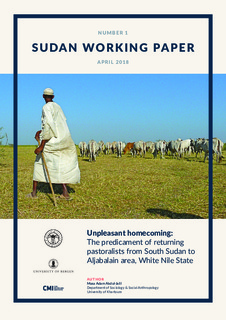Unpleasant homecoming: The predicament of returning pastoralists from South Sudan to Aljabalain Area, White Nile State
Working paper
Permanent lenke
http://hdl.handle.net/11250/2495769Utgivelsesdato
2018-04-01Metadata
Vis full innførselSamlinger
- Publications [1488]
Originalversjon
Bergen: Chr. Michelsen Institute (Sudan Working Paper no. SWP 2018:1) 20 p.Sammendrag
In many countries around the world (especially in Africa), the livelihood of pastoralists depends largely on trekking over vast areas of land in constant search of water and pasture for their animals. This nomadic life brings certain challenges including a constant desire to escape adverse conditions of animal health, government taxes and security threats. Pastoralists try to adapt to constantly changing conditions in the wider context of their existence. This applies to both the physical environment and the socio-economic and political conditions surrounding them. Although risk is a permanent part of life for human beings, its materialisation in the form of environmental threats is something that pastoralists in particular face. Like other human groups, pastoralists have their own priorities that they try to pursue; nevertheless, they are not always sure how to best satisfy their interests, this justifies the mobile lifestyle they adopt. Pastoralists often move across both administrative boundaries and international borders in search of better conditions for their animals, and ultimately themselves. In so doing they trade one type of risk for another and run into new risks, such as the threat of legal or security action by state agencies.
